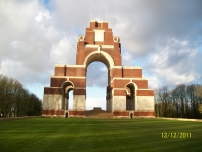| First Name: | William | Last Name: | DENGATE | |
|---|---|---|---|---|
| Date of Death: | 01/07/1916 | Lived/Born In: | Clapham | |
| Rank: | Lance Coporal | Unit: | London9 | |
| Memorial Site: | Thiepval Memorial | |||
Current Information:Enlisted-London
The opening day of the Battle of the Somme 1st July 1916 This was a disastrous day for the British Army in France. Eleven divisions of Fourth Army attacked along a 15 mile front from Maricourt to Serre. Two further divisions of Third Army launched a diversionary attack just to the north of Serre at Gommecourt. For a week beforehand the British artillery pounded the German trenches but the Germans had been there for a long time and they had constructed deep, concrete reinforced shelters beneath their trenches and many survived the bombardment. The troops went over the top at 7.30 am but even before they had left their overcrowded trenches, many had been killed or maimed by German artillery. The Germans knew that they were coming. Once in No-Man’s-Land the artillery continued to take its toll and then the machine guns opened up on the advancing British infantry. They fell in their thousands and the attack came to a standstill almost everywhere. Survivors sought cover wherever they could find it and at night they crawled back to their own lines, often dragging a wounded soldier with them. Only in the south were any advances made with the attack on Fricourt and Mametz. Over 19,000 British soldiers were killed on this day, including 2,500 from London. The attack on Gommecourt The 56th (London) Division and the 46th (North Midland) Division carried out the diversionary attack on Gommecourt. It was intended to draw German reserves away from the main battle further south and to pinch out the Gommecourt salient. It failed on both counts. The German defences at Gommecourt were among the strongest any British attack faced on 1st July. Nevertheless 56th Division’s attack on the southern edge of the salient began promisingly. The first two German lines were taken but they could get no further. 46th Division’s attack came to grief on the uncut wire and by the end of a very bloody day all but the dead and injured were back in their own trenches. On 1st July, 169 Brigade of 56th Division attacked with 5th London and 9th London. 16th London (Queen’s Westminster Rifles) were detailed to pass through them once they had taken their objectives and capture a German stronghold called the Quadrilateral. But events did not work out as planned. The wire had not been cut properly and there were only a few gaps in it through which the attacking troops of 9th London and 16th London could pass and whilst they waited they were hit by concentrated machine gun fire. Despite this some did make it through and into the German trenches. At this stage the German artillery opened up with full force, plastering no-man’s land and preventing supplies and reinforcements getting across. By now the German defenders had emerged from their deep dug outs and were pouring fire on the Londoners from their strongly held reserve trenches. Even so, some of the attacking force managed to push on to Nameless Farm road, a sunken road, but this is as far as they got. To show one’s head above the 4 ½ foot bank of the sunken road meant instant death. By midday the Londoners were running short of grenades and they were under strong bombing attacks from Gommecourt Park which gradually forced them back. There was little help from the British artillery and the wounded began crawling back across no-man’s land. By 2pm they were still holding parts of the German first and second lines and the southern part of Gommecourt Park. But their position was doomed. There was no further attack from 46th Division and to the south news came of the failure of 31st Division. Nevertheless they continued to resist but by 4pm the Germans had retaken their second trench and had footings in the first. Before dark the Londoner’s numbers had been reduced to seventy holding a small part of Ferret Trench two hundred yards from Gommecourt Park and at 9.30pm the last party made it back suffering badly en route. The planned renewed attack did not take place The 9th London battalion sustained a very high number of casualties during this operation, one of whom was William Dengate. |
||||
| « Back to Search Results | ||||
| If you think any of the information shown here is incorrect, Click Here to submit your amends and comments | ||||




